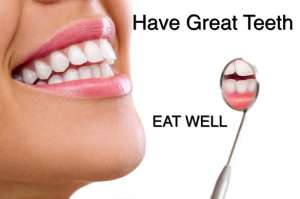It turns out that although these ideas aren’t popularized in conventional medicine and the mainstream media, there are facts that have been well investigated and proven to be true.
Here are a few facts that all of us commonly accept and acknowledge, as a basis for this discussion:
- A lack of nutrients can make us sick (i.e., the body doesn’t function and heal as it should).
- Bones can heal from injury, and good nutrition helps the body do this.
- Children who lack vitamin D during development get rickets (deformed bones).
This brings us to the main tenet of dental health today: avoiding sugar. But what about the opposite approach—can we eat foods that actively nourish and heal our teeth? And can teeth heal themselves just like bones? The answer is yes! A few notable dentists during the twentieth century studied populations consuming traditional diets all over the world. Although their diets varied based on what was locally available, it was observed that the diets had a few key things in common.
- All traditional diets were rich in minerals.
- All traditional diets were rich in fat-soluble vitamins, i.e., vitamins A, D, E and K.
- Traditional foods were grown, prepared and eaten such that nutrients were highly bio-available, meaning easy to digest and absorb. This is often related to the removal of phytic acid from foods.
When people from traditional societies are fed a Western diet, they begin to experience dental cavities, while the opposite is true if a person is transitioned to a nutrient-dense traditional diet; the teeth are able to heal, just like the rest of our bones.
Conversely, we consider braces to be a routine part of growing up today. Although this is normalized in our society, it is actually a concerning sign that our modern diet does not support healthy formation of bones and teeth.
Although we are not suffering as badly as those in the eighteenth and nineteenth centuries with low vitamin D causing rickets, we have an insidious rate of skeletal deformation. This is linked to the large-scale modern dependence on low-nutrient and pro-inflammatory foods.
 So what are some nutritious choices that can help support dental health?
So what are some nutritious choices that can help support dental health?It’s recommended that we consciously adjust our modern diet to be more similar to those traditional diets that have been observed to create robust bones and teeth. This will not only help us have children with naturally well-formed smiles, but also help prevent and even re-mineralize dental cavities in adults.
Consume more minerals from whole foods, not supplements. Foods high in magnesium include pumpkin seeds, brazil nuts, caviar and tomatoes. Excellent sources of zinc include oysters, ground beef and liver. Calcium is best absorbed from leafy greens and bone-in fish, such as canned salmon or sardines.
Consume more fat-soluble vitamins (A, D, E and K). These work synergistically to prevent infection, support growth and repair, and ensure the minerals you’ve consumed are used correctly within the body’s systems. Liver, fish, shellfish, aged cheese, grass-fed butter, mushrooms and sunflower seeds are some recommended foods to add in. It should go without saying that consuming fat is also necessary for the absorption of these fat-soluble vitamins.
Consume gluten-free grains, legumes, nuts and seeds that have been prepared in such a way that phytic acid levels are reduced. This normally involves soaking and sprouting.
It’s never too late to start improving dental health with improved nutrition. You might even be able to prevent your next dentist visit by encouraging your teeth to re-mineralize naturally with these pieces of traditional wisdom.
—The Alternative Daily
No comments:
Post a Comment